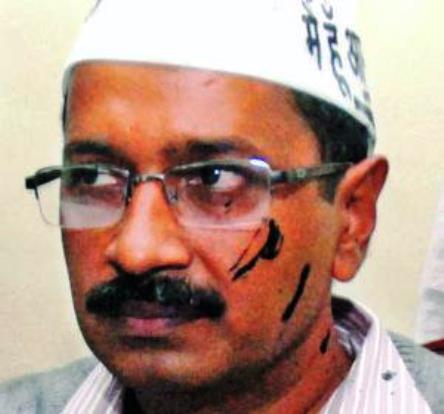Information & Broadcasting Minister Manish Tewari hit the nail on the head by questioning the Aam Aadmi Party’s (AAP’s) patriotism on the day it withdrew its melodramatic agitation. He said, “People of this country need to ask AAP if they believe in the idea of India as a republic. Because if they believe in this idea, one would not resort to the kind of anarchy that they have resorted to right now.”
The pointless dharna that Delhi Chief Minister and AAP boss Arvind Kejriwal resorted to should not be dismissed as another instance of the party’s theatrics. For too long, the AAP has evaded questions about its ideology; the media too has exhibited shallowness by excessively highlighting the issues like the size of Kejriwal’s official residence and not properly scrutinizing the contours of its political and economic beliefs.
The new party has been deft in ducking uncomfortable queries. “Ideology is one for the pundits and the media to pontificate about,” the party’s website says. But its leaders continue to promote the Naxal agenda. So, Prashant Bhushan talks like a spokesman of the jihadists in Kashmir and Maoists in central and eastern states. When there is a furore, the AAP just dodges questions, saying that the party does not agree with him. But what, pray, are the party’s views? No answer. Has Bhushan been reprimanded by Delhi’s ruling party for his traitorous opinions? Not at all. He remains a party ideologue. Senior AAP leaders have slammed state Law Minister Somnath Bharti for his loose talk, but Bhushan remains unscathed despite his anti-national statements.
Contrast this with the aftermath of Advani’s Jinnah remarks. Decades of good work for the Bharatiya Janata Party could not check his fall from grace in the Sangh Parivar. This happened because his statement was viewed as something militating against the salience of Hindutva. Bhushan’s statements, on the other hand, are very much in consonance with the beliefs of top AAP bosses, the beliefs that these johnnies are unwilling to share with the people of India on one pretext or another.
Kejriwal’s comment on the Republic Day should be viewed in this context. He said: “We will continue to sit here and this will be the best Republic Day. People will come from different parts of the country and this Republic Day there won’t be processions but government will find people on the streets.”
Kejriwal & Co. unilaterally decide what would be the best way to celebrate the Republic Day—and they thrust that decision on the nation. And why should the day be celebrated in a new way? Because the AAP bosses wanted a few police officers suspended!
Actually, such cavalier attitude towards the R-Day celebrations reflects the AAP’s disdain for the Indian Republic as we know it. Many people, including this writer, have written extensively about the problems plaguing the Republic. But the solutions lie neither in a willful disregard of conventions and symbols nor in political buffoonery Kejriwal is so fond of. Nor, as President Pranab Mukherjee said in his Republic Day-eve speech, “populist anarchy cannot be a substitute for governance.” (I’ll write on anarchism in the next article).
Kejriwal wants to see “people on the streets” protesting against something or another; he is loath to the “processions” celebrating 64 years as Republic. This gives us an opportunity to peek into the mind of the Chief Minister of the National Capital: unfortunately, it does not look like the mind of a democrat who wants to fight problems following proper procedures and make the country a better place; his mental process is frighteningly similar to the thinking of Maoists who believe that the old has to be destroyed to build the new. The motto of the true democrat is: old order changeth, yielding place to new. The motto of the totalitarian masquerading as a democrat is: destroy the old so that the new could be built. Kejriwal has the mask of a democrat, but his ideology is patently anti-democratic; he believes in Maoism: he is a false prophet, an antichrist.
Kejriwal believes in neither standard political practice politics nor conventional morality. So, he has no compunctions in staging a protest while being a chief minister. Now that may be okay, albeit idiotic, if in the process no law is broken. But he violated the law when he sat on dharna as such gatherings were banned by the local authorities. Second, he asked cops to shed uniform and join the protest.
Such acts and statements show the character of Naxalites like Kejriwal. He takes oath to protect the Constitution—and goes on to rip apart everything that emanates from it, be it the laws, rules, or procedures that are so essential for good governance.
Make no mistake about it: what we are facing today in the AAP is not histrionics that often causes minor inconvenience; it is mortal enemy of the Indian Republic, though this fact has escaped the attention of the supposedly liberal and educated people like Meera Sanyal and Capt. Gopinath. They, like simpler folks, have been seduced by the meretricious charms of the party that promises paradise on earth.
But behind the illusionism that the AAP has successfully exercised lies Kejriwal’s cunning mind and rancorous heart which hate the Indian Republic. Hence his disgust with R-Day pageantry.
Ravi Shanker Kapoor is a journalist and author. He upholds freedom of expression, individual liberty, free market, and open society. He is an uncompromising opponent of Islamism, communism, and other totalitarian ideologies. He is also a critic of intellectuals, as evident from his third book, How India’s Intellectuals Spread Lies (Vision Books).

